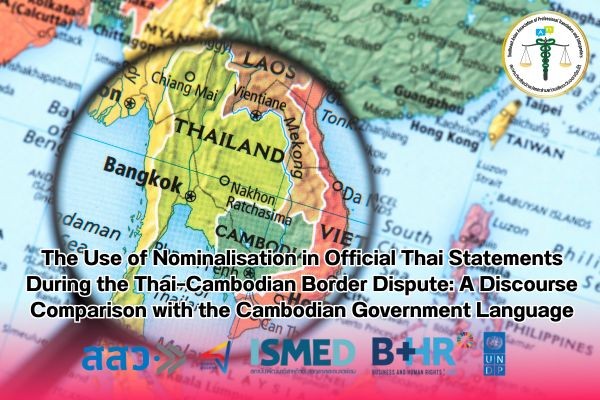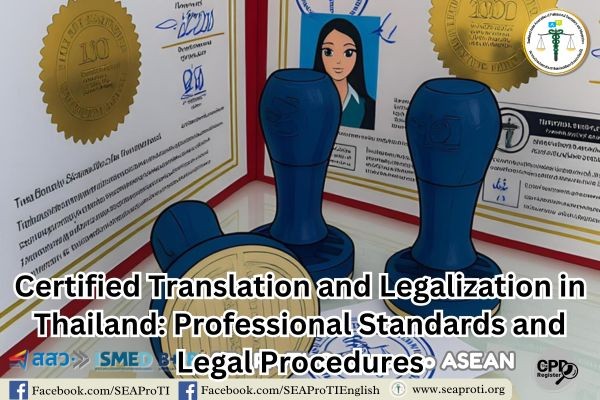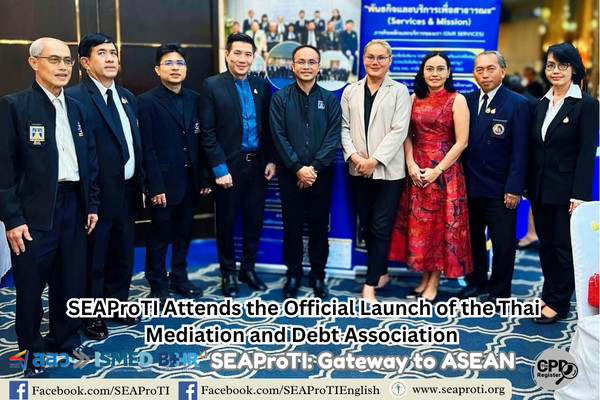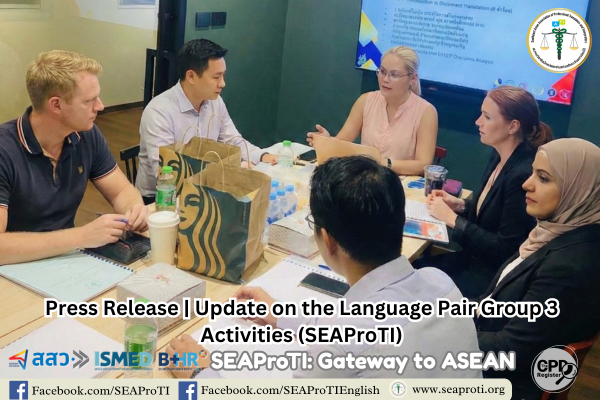The Use of Nominalisation in Official Thai Statements During the Thai–Cambodian Border Dispute:
A Discourse Comparison with the Cambodian Government Language
by Wanitcha Sumanat, the president of the Southeast Asian Association of Professional Translators and Interpreters
2 August 2025, Bangkok – This article analyzes the use of nominalisation—the transformation of verbs into nouns—in official statements by Thai government agencies during the Thai–Cambodian border dispute. It explores how this linguistic strategy functions to avoid direct attribution of agency and soften the tone of the message to align with diplomatic objectives. In contrast, the article compares these with statements issued by the Cambodian government, which employ direct language without euphemism or nominalisation. This comparative discourse analysis reveals the divergent rhetorical strategies and communicative goals employed by the two states in a context of international tension.
Introduction
Nominalisation, or the transformation of verbs into abstract nouns, is a prominent linguistic feature in official state discourse, particularly in contexts involving international conflict or crisis. This technique helps neutralize statements, obscure agency, and create a tone of institutional formality. This contrasts with the linguistic strategies of some states that employ direct, accusatory language that clearly identifies agents and their actions.
Nominalisation and Linguistic Characteristics
Halliday and Matthiessen (2014) explain that nominalisation is a key component in the grammar of formal and institutional language, enabling abstract representation of events and actions without specifying the actor. For example, the verb “attack” may be converted into the noun “attack” (as in “the attack”), omitting the subject who carried it out, thereby neutralizing the tone.
The Use of Nominalisation in Thai Government Statements
During the Thai–Cambodian border conflict, Thai government statements typically exhibited the following features:
- Obfuscation of agency: e.g., “the attack on civilian targets” instead of “Cambodian forces launched a rocket attack.”
- Avoidance of direct accusations: e.g., “violation of the ceasefire agreement” instead of “Cambodia breached the agreement.”
- Event-centered language: e.g., “damage to civilian property” without naming who caused the damage.
These choices reflect the intention to preserve diplomatic relations and avoid direct attribution of blame in international forums (Brown & Levinson, 1987; Bhatia, 2006).
Cambodian Government Language: Direct Attribution of Agency
In contrast, Cambodian official statements employed direct and unambiguous language using active voice, with clear attribution of agency, such as:
- “Thai troops shelled Cambodian villages, killing civilians.”
- “This is a direct invasion of Cambodian territory by Thai soldiers.”
These constructions represent a rhetorical strategy of direct accusation, designed to apply pressure on the opposing side and portray Cambodia as the victim before the international community. This contrasts with Thailand’s more neutral and institutionally toned discourse.
Comparative Discourse Analysis
| Dimension | Thailand (Nominalisation) | Cambodia (Direct Attribution) |
|---|---|---|
| Grammatical structure | Passive / Nominalised | Active Voice |
| Attribution of agency | Obscured or omitted | Clearly specified |
| Intent | Face-saving / Diplomatic formality | Direct accusation / Legitimacy seeking |
| Tone | Institutional / Neutral | Emotional / Confrontational |
While nominalisation allows the Thai state language to appear formal and diplomatic, it may also be critiqued for lacking clarity and transparency to the public. In contrast, Cambodia’s straightforward approach makes the message more accessible to general audiences but may increase political tension.
Conclusion
The use of nominalisation in Thai official discourse during the border dispute illustrates a deliberate linguistic strategy to maintain international diplomacy and project institutional maturity. In contrast, Cambodian rhetoric prioritizes clarity and blame attribution, aiming to generate international sympathy and political pressure. This divergence reflects differing discourse ideologies and political communication strategies between the two nations.
References:
- Bhatia, V. K. (2006). Worlds of written discourse: A genre-based view. London: Continuum.
- Brown, P., & Levinson, S. C. (1987). Politeness: Some universals in language usage (2nd ed.). Cambridge University Press.
- Halliday, M. A. K., & Matthiessen, C. M. I. M. (2014). Halliday’s Introduction to Functional Grammar (4th ed.). Routledge.
- Ministry of Foreign Affairs of Thailand. (2025, July). Official statement regarding the border situation with Cambodia [Press release].
- Statement on strongly condemning the illegal aggression committed by the armed forces of the Thai military [Press conference transcript].
SEAProTI’s certified translators, translation certification providers, and certified interpreters:
The Southeast Asian Association of Professional Translators and Interpreters (SEAProTI) has officially announced the criteria and qualifications for individuals to register as “Certified Translators,” “Translation Certification Providers,” and “Certified Interpreters” under the association’s regulations. These guidelines are detailed in Sections 9 and 10 of the Royal Thai Government Gazette, issued by the Secretariat of the Cabinet under the Office of the Prime Minister of the Kingdom of Thailand, dated July 25, 2024, Volume 141, Part 66 Ng, Page 100. The Royal Thai Government Gazette
การใช้ Nominalisation ในถ้อยแถลงของหน่วยราชการไทยระหว่างข้อพิพาทกับกัมพูชา:
การเปรียบเทียบเชิงวาทกรรมกับภาษาของทางการกัมพูชา
โดย วณิชชา สุมานัส นายกสมาคมวิชาชีพนักแปลและล่ามแห่งเอเชียตะวันออกเฉียงใต้
2 สิงหาคม 2568, กรุงเทพมหานคร – บทความนี้วิเคราะห์การใช้ “Nominalisation” หรือการแปลงกริยาเป็นคำนามในถ้อยแถลงของหน่วยราชการไทยในช่วงข้อพิพาทชายแดนกับกัมพูชา โดยมุ่งศึกษาว่าการใช้ภาษาลักษณะนี้มีจุดประสงค์เพื่อหลีกเลี่ยงการระบุผู้กระทำโดยตรงและลดความรุนแรงของถ้อยคำเพื่อตอบสนองต่อเป้าหมายทางการทูต ในทางกลับกัน บทความยังเปรียบเทียบกับถ้อยแถลงของทางการกัมพูชาซึ่งใช้ภาษาตรงไปตรงมาและไม่มีการบรรเทาความหมายผ่าน Euphemism หรือ Nominalisation การเปรียบเทียบนี้สะท้อนให้เห็นถึงความแตกต่างของยุทธศาสตร์วาทกรรมและแนวทางการสื่อสารระหว่างรัฐ
บทนำ
Nominalisation หรือ “การแปลงคำกริยาให้กลายเป็นคำนาม” เป็นกลวิธีทางภาษาที่ปรากฏอย่างเด่นชัดในถ้อยแถลงของหน่วยงานรัฐ โดยเฉพาะในบริบทของความขัดแย้งหรือวิกฤติการณ์ระหว่างประเทศ การใช้ Nominalisation ช่วยลดความคมของถ้อยคำ ปกปิดผู้กระทำ และสร้างภาพลักษณ์ที่เป็นกลาง ซึ่งต่างจากภาษาของบางรัฐที่ใช้โครงสร้างภาษาที่ตรงไปตรงมา กล่าวหาผู้กระทำอย่างชัดเจน
Nominalisation และลักษณะทางภาษาศาสตร์
Halliday & Matthiessen (2014) อธิบายว่า Nominalisation เป็นกระบวนการสำคัญในภาษาทางการและภาษาเชิงสถาบัน ซึ่งช่วยให้ภาษามีความเป็นทางการ และเหมาะสมสำหรับการสื่อสารในระดับรัฐหรือองค์กรระหว่างประเทศ ตัวอย่างเช่น คำว่า “โจมตี” ซึ่งเดิมเป็นกริยา อาจถูกแปลงเป็น “การโจมตี” เพื่อเบลอผู้กระทำ
การใช้ Nominalisation ของหน่วยราชการไทย
ถ้อยแถลงของหน่วยงานไทยในช่วงข้อพิพาทชายแดนมักมีลักษณะดังนี้:
- การเบลอผู้กระทำ: เช่น “การโจมตีเป้าหมายพลเรือน” แทนการกล่าวว่า “ฝ่ายกัมพูชายิงจรวด”
- การหลีกเลี่ยงการกล่าวหาโดยตรง: เช่น “การละเมิดข้อตกลงหยุดยิง” แทน “กัมพูชาไม่เคารพข้อตกลง”
- เน้นเหตุการณ์มากกว่าตัวบุคคลหรือรัฐ: เช่น “ความเสียหายต่อทรัพย์สินของประชาชน” โดยไม่มีการระบุว่าเกิดจากใคร
จุดประสงค์คือเพื่อ รักษาสัมพันธภาพทางการทูต และ หลีกเลี่ยงการให้ร้ายฝ่ายตรงข้ามในเวทีสากล (Brown & Levinson, 1987; Bhatia, 2006)
ภาษาของทางการกัมพูชา: การระบุผู้กระทำโดยตรง
ในทางกลับกัน ถ้อยแถลงของกัมพูชามักใช้ภาษาที่ตรงไปตรงมา โดยใช้ Active Voice และระบุชื่อผู้กระทำชัดเจน เช่น
- “ทหารไทยยิงปืนใหญ่ใส่หมู่บ้านกัมพูชา ทำให้ประชาชนเสียชีวิต”
- “นี่คือการรุกรานดินแดนของกัมพูชาโดยทหารไทย”
ลักษณะนี้สะท้อนยุทธศาสตร์วาทกรรมที่เน้น การกล่าวหาโดยตรง เพื่อ สร้างแรงกดดันต่อฝ่ายตรงข้าม และ สื่อสารให้ประชาคมโลกเห็นภาพของความเป็น ‘เหยื่อ’ ซึ่งแตกต่างจากไทยที่พยายามรักษาท่าทีเป็นกลาง
การเปรียบเทียบเชิงวาทกรรม
| มิติ | ไทย (Nominalisation) | กัมพูชา (ภาษาตรงไปตรงมา) |
|---|---|---|
| รูปแบบไวยากรณ์ | Passive/Nominalised | Active Voice |
| การระบุผู้กระทำ | เบลอ หรือไม่ระบุ | ระบุผู้กระทำชัดเจน |
| เจตนา | รักษาหน้า / เป็นทางการ | กล่าวหา / สร้างความชอบธรรม |
| ภาษาที่ใช้ | ทางการ / สถาบัน | อารมณ์ / กล่าวโทษ |
Nominalisation ช่วยให้ภาษาไทยมีลักษณะทางการ เหมาะกับการสื่อสารในบริบทการทูต แต่ก็อาจถูกวิจารณ์ว่า ไม่สื่อสารอย่างชัดเจนต่อสาธารณะ ขณะที่ภาษาของกัมพูชานั้นตรง ประชาชนเข้าใจง่าย แต่ก็อาจนำไปสู่ความตึงเครียดทางการเมืองมากขึ้น
บทสรุป
การใช้ Nominalisation ในถ้อยแถลงของหน่วยราชการไทยในช่วงข้อพิพาทชายแดน เป็นกลยุทธ์ทางภาษาที่มีบทบาทสำคัญในการรักษาสัมพันธภาพระหว่างประเทศ และสร้างภาพลักษณ์ของรัฐที่มีวุฒิภาวะทางการทูต แตกต่างจากภาษาของทางการกัมพูชาที่เน้นความชัดเจนและการกล่าวหาตรง ๆ ความแตกต่างนี้สะท้อนให้เห็นถึง มุมมองทางวาทกรรม และ กลยุทธ์ทางการเมือง ที่ต่างกันของทั้งสองประเทศ
เอกสารอ้างอิง
- Bhatia, V. K. (2006). Worlds of written discourse: A genre-based view. London: Continuum.
- Brown, P., & Levinson, S. C. (1987). Politeness: Some universals in language usage (2nd ed.). Cambridge University Press.
- Halliday, M. A. K., & Matthiessen, C. M. I. M. (2014). Halliday’s Introduction to Functional Grammar (4th ed.). Routledge.
- Ministry of Foreign Affairs of Thailand. (2025, July). Official statement regarding the border situation with Cambodia. [Press release].
- Statement on strongly condemning the illegal aggression committed by the armed forces of the Thai military. [Press conference transcript].
เกี่ยวกับนักแปลรับรอง ผู้รับรองการแปล และล่ามรับรองของสมาคมวิชาชีพนักแปลและล่ามแห่งเอเชียตะวันออกเฉียงใต้
สมาคมวิชาชีพนักแปลและล่ามแห่งเอเชียตะวันออกเฉียงใต้ (SEAProTI) ได้ประกาศหลักเกณฑ์และคุณสมบัติผู้ที่ขึ้นทะเบียนเป็น “นักแปลรับรอง (Certified Translators) และผู้รับรองการแปล (Translation Certification Providers) และล่ามรับรอง (Certified Interpreters)” ของสมาคม หมวดที่ 9 และหมวดที่ 10 ในราชกิจจานุเบกษา ของสำนักเลขาธิการคณะรัฐมนตรี ในสำนักนายกรัฐมนตรี แห่งราชอาณาจักรไทย ลงวันที่ 25 ก.ค. 2567 เล่มที่ 141 ตอนที่ 66 ง หน้า 100 อ่านฉบับเต็มได้ที่: นักแปลรับรอง ผู้รับรองการแปล และล่ามรับรอง
อ่านเพิ่มเติม:

























